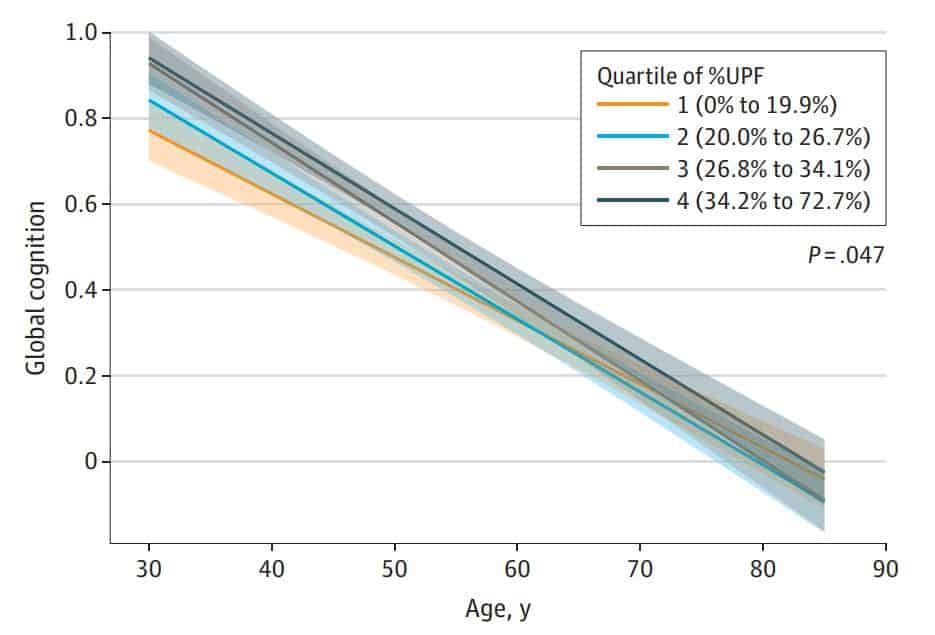As the average life expectancy of the global population rises, the number of people living with dementia is expected to rise from 57 million in 2019 to 153 million in 2050. In high-income nations, dementia is the leading contributor to disability, and it ranks among the top 10 contributors in low- and middle-income nations.
The fact that there aren’t many effective treatments for dementia shows how important it is to find ways to stop or delay the onset of dementia to reduce the stress it causes.
Dementia prevention has been linked to changes in lifestyle, including exercise, a good diet, and quitting smoking.
Healthy eating practices have been associated with increased brain volume and a lower risk of cognitive decline over time. These practices include high consumption of healthy grains, vegetables, fruit, nuts, and seafood.
Over the last four decades, the food distribution sectors have accelerated the market penetration of ultra-processed foods (UPFs). These UPFs are made from processed food ingredients like oils, fats, sugars, starches, and protein isolates. They don’t have much or any whole food in them and usually have flavorings, colors, emulsifiers, and other cosmetic additives.
UPFs include processed meats, sweet and savory snacks, candy, morning cereals, ice cream, drinks with added sugar, and ready-to-eat frozen meals.
UPFs account for 58% of calories ingested by US residents, 57% of calories consumed by British citizens, and 48% of calories consumed by Canadian citizens.
This food category makes up about 30% of the total calories consumed in Brazil. Consuming UPFs has been associated with a higher risk of obesity, metabolic syndrome, and cardiovascular disease.
However, few studies have looked at the link between UPF and cognitive impairment in high-income countries.
Therefore, the team wanted to look into the association between UPF consumption at baseline and cognitive decline in the Brazilian Longitudinal Study of Adult Health (ELSA-Brasil).
This was a multicenter, prospective cohort study with 3 waves, approximately 4 years apart, from 2008 to 2017. Data were analyzed from December 2021 to May 2022. Participants were public servants aged 35 to 74 years old recruited in 6 Brazilian cities. Participants who, at baseline, had incomplete food frequency questionnaire, cognitive, or covariate data were excluded. Participants who reported extreme calorie intake (<600 kcal/day or >6000 kcal/day) and those taking medication that could negatively interfere with cognitive performance were also excluded.
A total of 15105 individuals were recruited and 4330 were excluded, leaving 10775 participants. The median (range) duration of follow-up was 8 (6-10) years. At baseline,
the mean (SD) age of the participants was 51.6 (8.9) years, 5880 participants (54.6%) were women, 5723 (53.1%) were White, and 6106 (56.6%) had at least a college education.
The mean (SD) BMI was 26.9 (4.7), and the mean (SD) total daily calorie intake was 2856 (992) kcal, 27% of which came from UPF (mean [SD], 785.0 [419.1] kcal/day).
Compared with the lower quartile of the percentage of daily energy from UPF, those in the fourth quartile (ie, highest UPF consumption) were more likely to be younger, women, White, had higher education and income, were more likely to be nonsmokers, and less likely to be current alcohol consumers.
The highest quartile also had a higher total energy intake, lower physical activity, and lower frequency of comorbidities, but a higher frequency of depressive symptoms.
Foods were classified according to the extent of industrial processing using the Nova classification system. Nova includes 4 food groups.
Group 1 includes unprocessed or minimally processed foods, such as fresh, dry, or frozen fruits or vegetables, grains, legumes, meat, fish, and milk, which have undergone minimal processing like grinding, roasting, pasteurization, or freezing.
Group 2 includes processed culinary ingredients, such as table sugar, oils, salt, and other substances that have been extracted, pressed, or centrifuged from group 1 foods or from nature, and are used to make culinary preparations.
Group 3 includes processed foods,which are manufactured using unprocessed or minimally processed foods, and ingredients from group 2 are used to prolong the durability of foods and modify their palatability. Examples of foods in group 3 include canned fruits, artisanal bread and cheese, and salted, smoked, or cured meat or fish.
Group 4 includes UPFs, which are formulations of several ingredients from group 2 with food additives not used in home preparations, such as flavors, colors, sweeteners, emulsifiers, and other substances used to disguise undesirable qualities of the final product or imitate the sensorial qualities of culinary preparations from group.
The findings:
After a median follow-up of 8 years, participants who reported consumption of UPF of more than 19.9% of daily calories had a 28% faster rate of global cognitive decline compared with those who reported consumption of UPF up to 19.9% of daily calories

Moreover, participants who reported consumption of UPF more than 19.9% of daily calories had a 25% faster rate of executive function decline compared with those who reported consumption of UPF less than or equal to 19.9% of daily calories.
They came to the conclusion that people who get more of their daily energy from ultra-processed foods are likely to lose brain function more quickly.
Source: 10.1001/jamaneurol.2022.4397
Image credit: Getty
